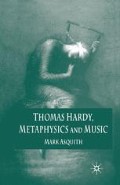Abstract
The sign of the Three Mariners Inn which stands in the centre of Casterbridge depicts three sailors ‘represented by the artist as persons of two dimensions only… so that they were but a half-invisible film upon the reality of the grain, and knots, and nails, which composed the signboard’ (p. 57). It is to this inn that the three travellers — Farfrae, Susan and Elizabeth-Jane — gravitate when they first enter the town, leading the reader to connect their function in the narrative with the monolithic representations on the signboard. R. H. Hutton, reviewing the novel in the Spectator in 1886, found some ‘failure of art’ in the anaemic representation of these characters; but this is to misread Hardy’s aesthetic purpose, which appears to have been to use their particular human attributes to explore specific elements of Henchard’s temperament.1 For, in this novel Henchard dominates the narrative in the same way that his forcefulness enables him to eclipse those around him. Thus, when we consider the full title, The Life and Death of the Mayor of Casterbridge: A Story of a Man of Character, it is quite clear that Hardy’s narrative is not to focus on a human relationship, since none of the characters surrounding him is strong enough to sustain an equal part in any kind of alliance. His story is, rather, the connection between a man’s character and his destiny.
Access this chapter
Tax calculation will be finalised at checkout
Purchases are for personal use only
Preview
Unable to display preview. Download preview PDF.
Notes
See Patterson, John, ‘The Mayor of Casterbridge as Tragedy’, Victorian Studies, 3 (December, 1959), 151–172. Virginia Woolf argues that ‘Henchard is pitted, not against another man, but against something outside himself which is opposed to men of his ambition and power.’ The Common Reader: Second Series, 9th edn (London: The Hogarth Press, 1974), p. 255.
Frederick R. Karl, ‘The Mayor of Casterbridge: A New Fiction Defined’, Modern Fiction Studies, 6 (Autumn, 1960), 195–213 (p. 207).
Sully, ‘The Aesthetic Aspects of Character’, Fortnightly Review (April, 1871), 247–283 (p. 267).
Moynahan, ‘The Mayor of Casterbridge and the Old Testament’s First Book of Samuel: A Study of some Literary Relationships’, PMLA, 71 (1956), 118–130.
Robert Kiely, ‘Vision and Viewpoint in The Mayor of Casterbridge’, Nineteenth Century Fiction, 23 (September, 1968), 189–200 (p. 193).
Craig Raine, ‘Conscious Artistry in The Mayor of Casterbridge’, in New Perspectives on Thomas Hardy, edited by Charles P. C. Petit (London: Macmillan, 1994), pp. 156–171 (p. 167).
Copyright information
© 2005 Mark Asquith
About this chapter
Cite this chapter
Asquith, M. (2005). ‘A Tragedy Appropriate for Its Time’: Music and the Story of a ‘Man of Character’. In: Thomas Hardy, Metaphysics and Music. Palgrave Macmillan, London. https://doi.org/10.1057/9780230508019_7
Download citation
DOI: https://doi.org/10.1057/9780230508019_7
Publisher Name: Palgrave Macmillan, London
Print ISBN: 978-1-349-52078-7
Online ISBN: 978-0-230-50801-9
eBook Packages: Palgrave Literature & Performing Arts CollectionLiterature, Cultural and Media Studies (R0)

